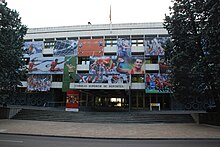| Consejo Superior de Deportes | |
 Logo of the CSD | |
 Headquarters of the CSD within Complutense University | |
| Agency overview | |
|---|---|
| Formed | 27 August 1977 |
| Preceding agency |
|
| Jurisdiction | |
| Headquarters | Madrid, Spain |
| Annual budget | € 381.8 million, 2023 [1] |
| Agency executive |
|
| Parent department | Ministry of Education, Vocational Training and Sports |
| Child agency | |
| Website | www.csd.gob.es |
The National Sports Council, also called Supreme Sports Council or High Council for Sports (Spanish : Consejo Superior de Deportes, CSD) is a Spanish government autonomous agency responsible for the promotion, planning and development of physical culture and sports activities of any kind, the coordination and support to social entities dedicated to sports as well as the relations between the Government and the Spanish Olympic Committee.
Contents
It is also in charge of the management and promotion of centers and services intended for sports practice, the sports education in schools and the inspection of the sports activities. [2] To control cheating in sport and ensure the good health of athletes, the CSD has attached the Spanish Commission for the Fight Against Doping in Sport, commonly known as the Spanish Anti-Doping Agency.
The agency is led by a senior official with the rank of Secretary of State that holds the title of President of the National Sports Council. Since 31 March 2021 the president of the agency is José Manuel Franco. [3]